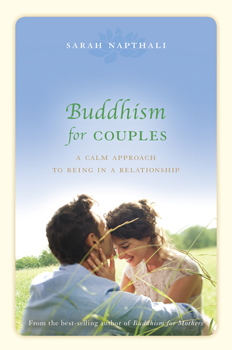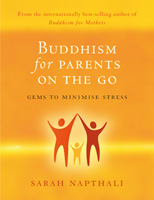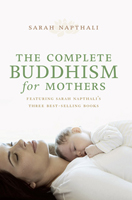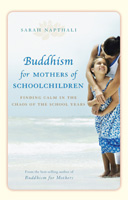Buddhism for Couples

Buddhism for Couples
Following her bestselling, internationally acclaimed Buddhism for Mothers series, Sarah Napthali brings us a practical guide for couples, drawing on Buddhist practice to delve deep into our psyche and discover what it really takes to maintain a happy partnership…
Every now and then – and not very often – we meet a woman who has mastered the art of being in a couple, who has managed to keep the flame alive long after the honeymoon period and well into the trials of parenting. Sarah Napthali is not one of these women but is happy for readers to learn from her mistakes.
With her trademark emphasis on self-compassion, Sarah explains how she has applied Buddhist teachings to patch things up, hold things together and even, on good days, scale the heights of relationship happiness. Written for both men and women, Buddhism for Couples tackles the loaded subjects of housework, anger, sex, conflict and infidelity, before introducing Buddhist strategies that can enrich a relationship.
Through mindfulness and ever-growing self-awareness, these Buddhist teachings can help us become more familiar with the workings of our minds and bodies, more aware of our thoughts and beliefs, and more emotionally honest with ourselves, so that we can see our behaviours with more clarity. Alongside Buddhist teachings, Sarah explores the latest psychological research on relationships and discovers numerous overlaps.
Persuading us to leave behind stale, habitual ways of relating that don't seem to work, Buddhism for Couples provides a fresh approach to living as a couple.
In a couple relationship for almost twenty years, Sarah Napthali is the mother of two teenage boys and a long-term practitioner of Buddhist teachings. She is the author of several parenting titles, including the bestselling Buddhism for Mothers, which has been translated into ten languages to date.
Buddhism for Couples
Allen and Unwin
Author: Sarah Napthali
ISBN: 9781743318102
RRP: $27.99
Interview with Sarah Napthali
Question: What inspired you to write Buddhism for Couples?
Sarah Napthali: The divorce rate in Australia is currently 43% which is actually a little lower than that of the United States and other European countries. The question I've always wondered about is how many of the intact relationships are contented ones given that the enormous stress of divorce is usually only for the extremely unhappy. In short, plenty of people must be struggling with their long-term relationship. As someone who has lived through numerous periods of relationship struggle, I know firsthand that Buddhist teachings, with their emphasis on compassion, forgiveness, mindfulness and self-awareness, are extremely helpful.
Question: How will applying Buddhism techniques ensure a strong relationship?
Sarah Napthali: Firstly, they encourage us to see our partner more clearly as we become more present to their reality rather than seeing them through the fog of our own needs. Secondly, Buddhism provides ways for us to live more calmly - through meditation, mindfulness throughout our daily life and the cultivation of joy - and these all make our fuses longer. We snap at our partners if we are too wound up. In addition, Buddhist teachings remind us that love is the goal, not power, not being right, not reforming someone in our own image.
Question: In short, can you explain Buddhism?
Sarah Napthali: Buddhist teachings all revolve around the Four Noble Truths which can be seen as a diagnosis and a prescription. The diagnosis is that our suffering is caused by our self-centred craving, for example, our craving for stuff, our craving to exist and have our existence constantly confirmed and our craving for things to be different to how they are. The prescription for this diagnosis, or the way to end that suffering, is the Buddha's Noble Eightfold path, which is a path that encompasses ethics, concentration and wisdom.
Question: How has Buddhism enhanced your own relationship?
Sarah Napthali: The greatest tool that Buddhism has brought to my relationship is mindfulness of my thinking. With years of practice behind me, I have learned to be very aware of my own thoughts so that my thoughts don't rule me, or become carried away. They are only thoughts, not truths. This is useful for the difficult times in a relationship when we might be prone to unhelpful habits such as ruminating or catastrophising. When you are aware of your thoughts and their effect on your emotions, it helps you to regulate what you say, and what you do, and this minimises conflict.
Question: What lead you to Buddhism?
Sarah Napthali: Throughout my twenties, I found Buddhism interesting from an intellectual point of view. It was, to me, a charming philosophy that I would dabble with from time to time. I particularly appreciated the message that contentment is something we cultivate within ourselves rather than relying on our external circumstances. When, aged 30, I was pregnant with my first child, I felt a strong urge to be the best person I could be, for the sake of my child, and I began to take my practice far more seriously. I felt that Buddhist teachings could provide the best path for cultivating important qualities I would need as a parent, such as equanimity, generosity and kindness.
Have You Seen This?
MORE







